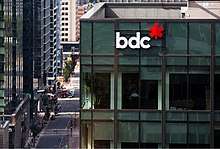Business Development Bank of Canada
The Business Development Bank of Canada (BDC; French: Banque de Développement du Canada) is a Crown corporation and national development bank wholly owned by the Government of Canada. Its mandate is to help create and develop Canadian businesses through financing, growth and transition capital, venture capital and advisory services, with a focus on small and medium-sized enterprises.[2]
 | |
| Crown corporation | |
| Industry | Development bank |
| Founded | Montreal, Quebec, Canada, 1944 |
| Founder | Parliament of Canada |
| Headquarters | Place Ville Marie Montreal, Quebec, Canada |
Key people |
|
| Total assets | $30.6 billion (F2019)[1]:30 |
Number of employees | 2,300 (F2019) |
| Website | www.bdc.ca |
The bank was founded in 1944,[3] and its corporate headquarters is located in Montreal. BDC has more than 123 business centres across Canada and 60,000 clients.[4] BDC's debt obligations, secured by the Government of Canada, are issued to public and private sector institutions.
History
The bank was established by an Act of Parliament[5] as the Industrial Development Bank (IDB) in September 1944. IDB was initially an arm of the Bank of Canada, and the Governor of the Bank was also Chief Executive Officer of the IDB. During its first years, the bank's main role was to help small "industrial enterprises" convert from military production to peacetime operations after the Second World War.[6] IDB was one of the first and largest development banks in the world.[6]
The Industrial Development Bank Act was first amended in 1952 to allow the bank to offer financing to companies in the commercial airlines industry. By the mid-1950s, one out of every 10 planes in Canada was financed by IDB.[6] Later, the Industrial Development Bank Act was amended two more times to allow the bank to lend to companies in almost all industries.
By 1964, twenty years after its foundation, IDB had 22 branches across Canada, covering main cities such as Halifax, Montreal, Toronto, Winnipeg, Calgary and Vancouver, and it also had operations in relatively rural areas. In the mid-1970s, the bank added consulting and training to its financial offerings to help entrepreneurs better manage their businesses.[7]
In 1975, the name of the bank changed to Federal Business Development Bank (FBDB), and its venture capital operations were started. At the time, the bank was known as "a lender of last resort"—supporting businesses in difficulty.[8]
In 1995, Parliament passed the Business Development Bank of Canada Act, leading to a new name and mission for the bank. The Act mandates BDC to promote entrepreneurship, with a special focus on the needs of small and medium-sized enterprises (SMEs), and to fill the market gaps and maximize financing alternatives for businesses by offering services that were complementary to those available from other financial institutions.[9]
BDC is financially self-sustaining.[10] Since 1998, it has been profitable and paid a total of more than $746 million in dividends to its sole shareholder, the Government of Canada.[11] Every ten years, the Minister of Industry must conduct a review of the provisions and operations of the BDC Act. The last legislative review was completed in December 2014.[12]
Services

BDC offers loans and advisory services with a focus on small and medium-sized companies. It reports to Parliament through the Minister of Innovation, Science and Economic Development.[13][14]
BDC Capital, a subsidiary of BDC, offers specialized financing, including venture capital, equity as well as growth and business transition capital.[15]
BDC's Venture Capital arm makes strategic investments in Canadian companies through its Energy/Cleantech Fund, Healthcare Fund and IT Fund. Notable investments include GradeSlam, Q1 Labs, Radian6, Canopy Labs, D-Wave Systems, and Klipfolio Dashboard.[16][17]
BDC is a complementary lender, offering commercial loans and investments that fill out or complete services available from private-sector financial institutions. It also provides advice to businesses through its advisory services division.[18]
Events and competitions organized by BDC
Small Business Week[19] is an annual celebration of entrepreneurs and their contribution to Canadian society. A wide range of activities is held across the country during the third week of October. Small Business Week was launched by BDC in 1979 and became a nationwide event in 1981.[20]
Recognition
BDC was named among Canada's Top 100 employers[21] every year between 2007 and 2018.
BDC Capital won multiple CVCA "Deal of the Year Award" for the venture capital category. It won in 2011, for its investment in Radian6 Technologies Inc.;[22] in 2012, for its investment in Q1 Labs Inc.;[23] and again in 2014, for its investment in Layer 7 Technologies.[24]
References
- Retrieved 2019-08-07
- Canada's Department Of Justice Retrieved 2012-05-04
- "History of the Business Development Bank of Canada". BDC.
- BDC Annual Report, 2017 Retrieved 2018-01-23
- Treasury Board of Canada Secretariat Retrieved 2012-05-04
- BDC Official website Retrieved 2012-05-04
- Official website Retrieved 2012-05-04
- History Archived 2018-01-24 at the Wayback Machine Retrieved 2018-01-23
- Canada's Department of Justice Retrieved 2012-05-04
- Official website Retrieved 2012-06-06
- BDC 2015 Annual Report p. 31. BDC 2019 Annual Report 2019 p.35
- Official website Retrieved 2015-08-12
- [http://www.appointments.gc.ca/prflOrg.asp?OrgID=FBD&lang=eng Government of Canada
- . Retrieved 2016-09-19
- BDC official website. http://www.bdc.ca/EN/about/Pages/default.aspx Government of Canada] Retrieved 2014-11-21
- Official website Retrieved 2014-06-05
- Official website Retrieved 2014-06-05
- Official website Retrieved 2012-05-04
- Canadian Intellectual Property Office
- Official website Retrieved 2012-05-04 Archived 2011-12-26 at the Wayback Machine
- Canada's Top 100 Employers. Retrieved 2012-05-04
- Canada's Venture Capital & Private Equity AssociationArchived 2012-08-18 at the Wayback Machine
- Venture Capital Retrieved 2018-01-23
- Technologies Retrieved 2018-01-23.